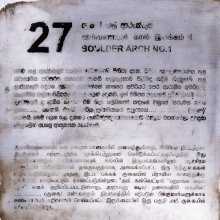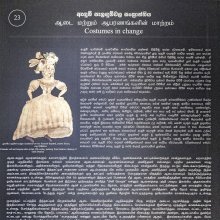Ak, Āk: 10 definitions
Introduction:
Ak means something in Hinduism, Sanskrit, biology. If you want to know the exact meaning, history, etymology or English translation of this term then check out the descriptions on this page. Add your comment or reference to a book if you want to contribute to this summary article.
Images (photo gallery)
In Hinduism
Vyakarana (Sanskrit grammar)
Source: Wikisource: A dictionary of Sanskrit grammar1) Ak (अक्).—Condensed expression (प्रत्याहार (pratyāhāra)) representing the letters अ, इ, उ, ऋ (a, i, u, ṛ) and लृ (lṛ) in Pāṇini's Grammar cf. P. VI.1.12, 101; VII.4.2.
2) Ak.—Sign (विकरण (vikaraṇa)) of the benedictive in Vedic Literature in the case of the root दृश् (dṛś) c. g. पितरं च दृशेयं (pitaraṃ ca dṛśeyaṃ) P.III.l.86 V 2;
3) Ak.—Remnant of the termnination अकच् (akac) P. V. 3. 71 ;
4) Ak.—Substitute (आदेश (ādeśa)) अकङ् (akaṅ) for the last vowel of the word मुधातृ (mudhātṛ) (P.IV.1.97) e. g. सोघातकिः (soghātakiḥ).
--- OR ---
Āk (आक्).—See above the word आ (ā) sense(5).

Vyakarana (व्याकरण, vyākaraṇa) refers to Sanskrit grammar and represents one of the six additional sciences (vedanga) to be studied along with the Vedas. Vyakarana concerns itself with the rules of Sanskrit grammar and linguistic analysis in order to establish the correct context of words and sentences.
Biology (plants and animals)
Source: Wisdom Library: Local Names of Plants and DrugsAk [आक] in the Hindi language is the name of a plant identified with Calotropis procera (Aiton) Dryand. from the Apocynaceae (Oleander) family having the following synonyms: Asclepias procera, Calotropis wallichii, Madorius procerus. For the possible medicinal usage of ak, you can check this page for potential sources and references, although be aware that any some or none of the side-effects may not be mentioned here, wether they be harmful or beneficial to health.
Source: Google Books: CRC World Dictionary (Regional names)1) Ak in India is the name of a plant defined with Calotropis gigantea in various botanical sources. This page contains potential references in Ayurveda, modern medicine, and other folk traditions or local practices It has the synonym Madorius giganteus (L.) Kuntze (among others).
2) Ak is also identified with Calotropis procera It has the synonym Asclepias gigantea Willd. (etc.).
3) Ak is also identified with Morinda tomentosa It has the synonym Morinda tomentosa B. Heyne.
4) Ak is also identified with Saccharum officinarum It has the synonym Saccharum officinarum var. giganteum Kunth (etc.).
Example references for further research on medicinal uses or toxicity (see latin names for full list):
· A General History of the Dichlamydeous Plants (1837)
· Synopseos Plantarum (1805)
· World J. Gastroenterol. (2517)
· Flore de la Polynésie Française (1892)
· Mémoires de l’Institut Égyptien (1901)
· Notes from the Royal Botanic Garden, Edinburgh (1980)
If you are looking for specific details regarding Ak, for example pregnancy safety, side effects, extract dosage, health benefits, chemical composition, diet and recipes, have a look at these references.

This sections includes definitions from the five kingdoms of living things: Animals, Plants, Fungi, Protists and Monera. It will include both the official binomial nomenclature (scientific names usually in Latin) as well as regional spellings and variants.
Languages of India and abroad
Sanskrit dictionary
Source: DDSA: The practical Sanskrit-English dictionaryAk (अक्).—1 P (akati) To go, move tortuously like a serpent [cf. L. angulus, Gr. agkai].
Source: Cologne Digital Sanskrit Dictionaries: Shabda-Sagara Sanskrit-English DictionaryAk (अक्).—[aka] r. 1st. cl. (akati) 1. To wind or move tortuously. With an indicatory i. aki (aṃkate) 1. To mark or bespot. 2. To go. See aṅka.
Source: Cologne Digital Sanskrit Dictionaries: Benfey Sanskrit-English DictionaryAk (अक्).—i. 1, [Parasmaipada.] To wind or move tortuously.
Source: Cologne Digital Sanskrit Dictionaries: Monier-Williams Sanskrit-English DictionaryAk (अक्):—[class] 1. [Parasmaipada] akati, to move tortuously (like a snake), [cf. Lexicographers, esp. such as amarasiṃha, halāyudha, hemacandra, etc.];—Cf. √ag and √añc.
Source: Cologne Digital Sanskrit Dictionaries: Goldstücker Sanskrit-English DictionaryAk (अक्):—[aka-bhvādi-ghaṭādi-udātta-udāttet-mit] r. 1st cl. par. (akati-āka-akitā-ākīt.—Caus. akayati) To wind or move tortuously. See also ag.
Source: Cologne Digital Sanskrit Dictionaries: Yates Sanskrit-English DictionaryAk (अक्):—(ma) akati 1. a. To wind about; with (iṅa) aṃkate 1. d. to mark.
[Sanskrit to German]
Sanskrit, also spelled संस्कृतम् (saṃskṛtam), is an ancient language of India commonly seen as the grandmother of the Indo-European language family (even English!). Closely allied with Prakrit and Pali, Sanskrit is more exhaustive in both grammar and terms and has the most extensive collection of literature in the world, greatly surpassing its sister-languages Greek and Latin.
See also (Relevant definitions)
Starts with (+4165): A-kamavinai, A-karaicimai, A-karaipatuttu, A-karpaviputi, A-kucalavetanai, Aakaarpatr, Aakashakshi, Aakasmik-kosh, Aakasmiktavaadi, Aakhyaanak-geet, Aakhyaat, Accaya Akodhana Sutta, Ak-bir, Ak-thor, Aka, Aka apura, Aka bakung, Aka barep, Aka belan, Aka bo ului.
Ends with (+1727): Aabrarak, Aachak, Aagamanaatmak, Aak, Aakhetak, Aalaapak, Aashajanak, Aatmarakshak, Abaddhavak, Abee-adrak, Abhavatmak, Abhibhavak, Abhiprerak, Abhirakshak, Abhisuchak, Abhrak, Abhyasmoolak, Acak, Achak, Achanak.
Full-text (+1075): Akudhryanc, Anavanc, Manak, Tattuka, Tattu, Adharacya, Adharacina, Tatta, Adharanc, Akalika, Svakriti, Shatkarakalakshana, Ba'ak, Ak-bir, Sark'ak'ya, Phu-ak, Chinin ak, Gur-balchor-ak, Ak'iisu'uk, Apamurdhan.
Relevant text
One of your search terms exceeds the minimun character amount per search term. This amount currently equals 2.
No search results for Ak, Āk in any book or story.



